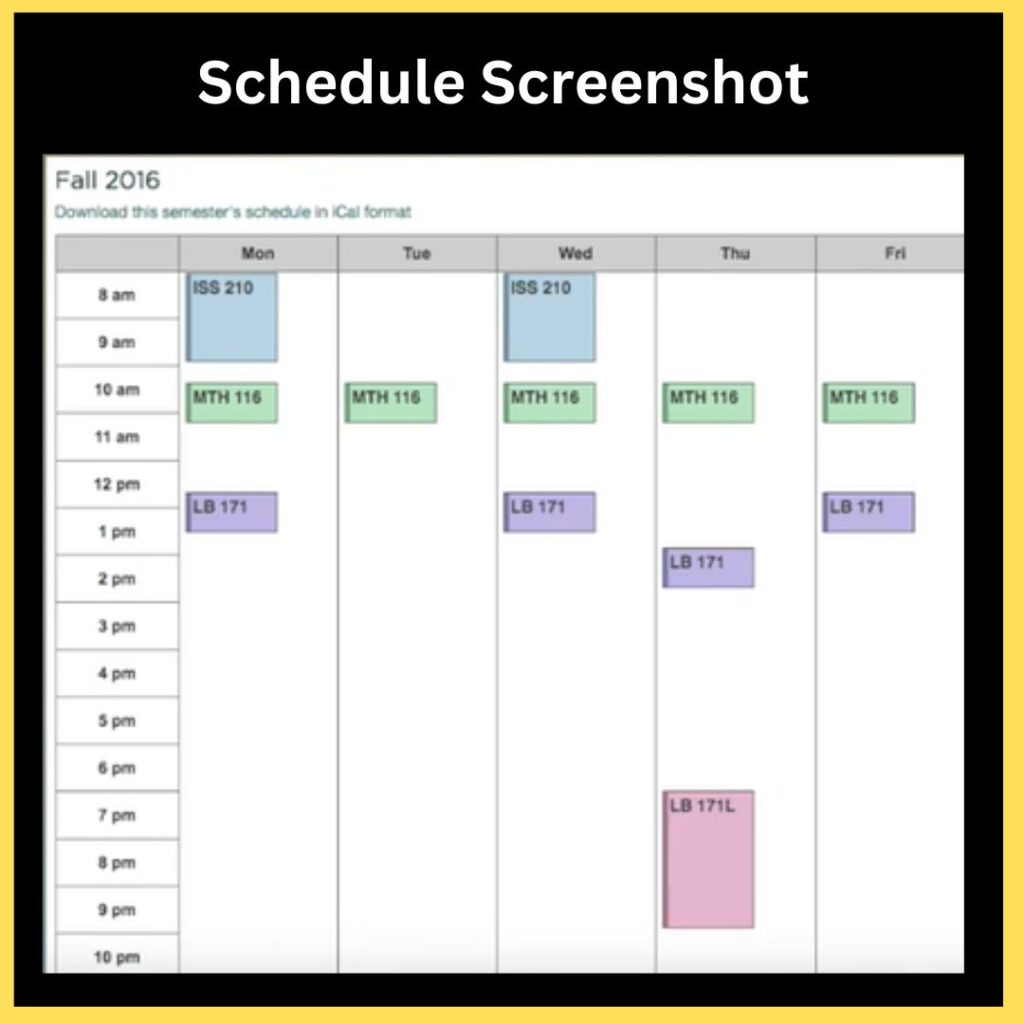Really smart move !!, yeah I am talking about you. Acknowledging the number of college classes helps you to prepare a better schedule, which results in various benefits, including a good GPA and chances of early graduation.
As I begin with your answer, I want to tell you that each university and respected degree has a different number of classes.
For your help, we have taken the scenario of 4 years of graduation. It’s my recommendation to read the full article. I have shared tips to strategize your course load and the relation of course load with scholarships.
How many classes do you take in college
Approx 90 percent of universities and colleges in the United States have adopted the Semester System, which means if we look into a four-year graduation, it has eight semesters, which include 4 to 5 classes each semester, and each class is associated with credit.
To pass your four-year graduation, the minimum credits for a full-time student is 120 credits, which means each semester you need to earn at least 12 to 15 credits and each class is associated with 3 to 4 credits.
Students also have the option of taking more classes and earning more credits. However, some colleges are limited to 18 (max credits per semester).
Tips to schedule your semester (Best for freshmen)
Being freshmen, after learning about the number of classes, you might be getting new questions in mind.
What are the classes I will study?
Is there any choice?
May I get any help related to the course plan?
No worry. Go through the tips below. It will help you to schedule your semester and choose the classes –
1. Discussion with advisors
To know your academic curriculum and select preferred classes to reach your goal, a college advisor is the right person to discuss with.
College Advisors have good experience in understanding students’ needs. Don’t be shy to share your likes and dislikes regarding academics, as knowing your interest will help the college advisor to give you the right suggestions and helps in structuring your course plan to get a good outcome.
College advisors not only help freshmen-year students but also sophomore, junior and senior-year students with their internships and post-graduation queries.
2. Go with General Education Classes
When you go through the curriculum regarding your degree, you might get to know the classes that don’t relate to your major.
Yeah, it seems unimportant, but to fulfil the prerequisites of the minimum credits per semester, you have to take them, and it’s my advice to take them in your freshmen year, as later it will not influence your core classes studies much.
Taking all of them, with a target of a minimum of 15 credits each semester, you must mix up the classes. You can also take advantage of the summer semester for general education classes.
3. Choose Electives
To balance your studies, universities offer electives unrelated to your major, but it is mandated to take, and their GPA calculation is different from the core classes, so indirectly, it can be an advantage to improve your GPA.
While coming from high school to college, you will feel a change, and to be comforted in that change and balance your academics, you can choose one of the electives in your freshmen year.
If you cannot decide on electives, get help from a college advisor.
4. Maintaining Course Load
Seeking your fellow mates or on the advice of others, don’t overload your schedule by taking 16 to 18 credits in the first semester of college, as everyone has different mindsets towards things. It’s better to have a slow pace start (earning 15 credits is considered a good start), and after exploring college, from sophomore year, you can increase credits, as per your comfort.
Remember, overloading classes will affect your GPA and learning scale. When I am pursuing my graduation, I have mixed up the course load of some less difficult classes with my core classes, as it helps to give me the option of studying with core classes.
5. Choose Class Time Slots Wisely
a. Avoid 8 am's
Yeah, there are 8 am classes as well. Do I go with it? Every one of us has a different mindset for the early wake-up, so if you are comfortable taking 8 am classes, you can go with it,
Pro tip – It is better if you take only 8 am’s that requires attendance
I prefer the 9 am class. It’s my recommendation while choosing the morning class; you should notice the distance of the dorm from the class.
b. Don't stack classes
Its recommendation is not to stack up all the classes in the first three days of the week. Keeping classes distributed for a week helps you in your routine and have enough time to understand each class and the gap between the classes, finalizing the notes you collect in class.
If I discuss my schedule, I start my classes at 9 am and have 1- or 2-hour classes between each class, so I have enough time for breakfast, lunch, and homework time. While choosing my time slot for the classes, I noticed the distance between the classes. While choosing the 9 am class, I saw how far it was from my dorm and if I had scheduled my classes one after another, whether close to each other or not. I try to wrap up my classes by 3 pm, so I have enough time the rest of the day to perform other kinds of stuff, including homework, gym time and college club meetups.
If there is a long distance between the classes and you want to arrange your time slots with classes nearby, you can discuss with professors of respected classes. They understand your problem and help you with this.
While I have given a screenshot of my schedule, might it help you? In my freshmen year, I kept three classes on Monday, Tuesday and Thursday, while on Wednesday and Friday, I kept two classes.

c. Use a Digital Calendar (phone and laptop)
My best advice is to have a digital calendar and mention all the classes with their time slots. It provides an ease to keep up with the schedule by giving the notifications. I used icalendar, as it gives notifications on my watch as well.
Additional advice
Influence of Course Credits & GPA with Financial Aids
As of now, you have gotten your brief regarding the number of classes you can take in college and tips to schedule your freshmen year (first semester). You must also know about financial aid’s relation with class credits and GPA.
As Financial Aid has certain conditions, it should be provided to full-time students with a minimum of 12 to 15 credits per semester, and some of them also ask for a good GPA. I recommend that you don’t overload your schedule, which affects your GPA and try to get a minimum of 15 credits each semester. So that financial aid doesn’t get affected.
Often, due to some circumstances such as health-related problems or death in your family, college can reduce your course load in exceptional cases and suggest students to manage in the next semesters.
Frequently Asked Questions
No 6 classes are not too much it totally depend on your schedule and classes you choose. while for the students who are working, they should make decision of 6 classes wisely.
You should take at least 2 classes a day and most important keep a gap between the classes, in which you can make your notes and do your home work.

About the author ....
Hi, I’m Erie Wilson “Think Tank” of this blog. Sharing knowledge related to career decisions since 2020, If you have any doubts related to choosing majors or searching for colleges, you are free to ask in the comments or send me an email.

